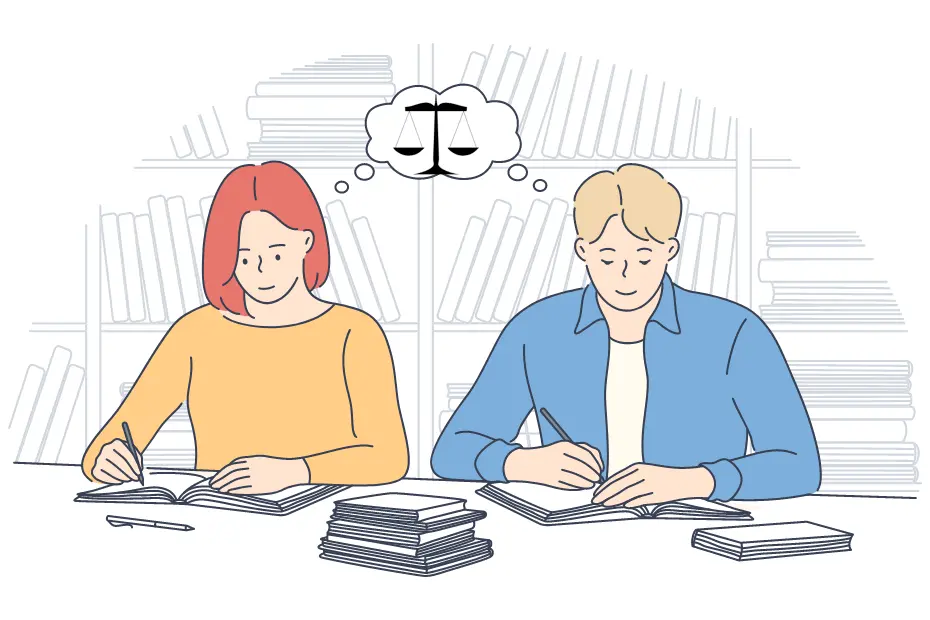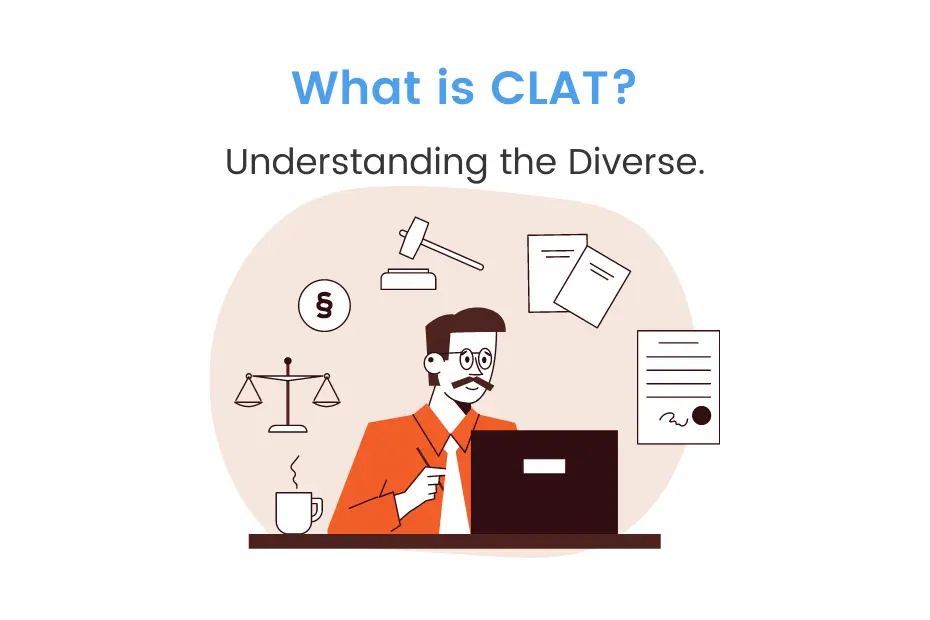Do you have the gift of gab? Are you an excellent communicator? Do you want to be a Lawyer? Are you planning to appear in the most challenging competitive exam i.e., the CLAT exam 2024? Or have you already started preparing for it? Or yet to figure out how to begin with the preparation?
Common Law Entrance Test (CLAT), a national-level examination organized by the Consortium of National Law Universities (NLU) gives admission to eligible candidates to study law courses in India at the undergraduate and postgraduate levels. Offering courses at 21 participating national law colleges and a host of other institutions across the country, the entrance test serves as a gateway to a lucrative career in law. Being one of the prestigious law entrance exams, CLAT has recently made some changes to update the test pattern. It no longer tests students’ cramming ability, but instead asks questions related to current events.
Anyhoo… this post shall take you through the many depths that you usually have to visit while figuring out everything about the exam.
Topics covered
What is the CLAT exam?
The full form of CLAT is the Common Law Entrance Test. The CLAT exam 2024 is a test to enter the national level of admission to 21 reputable national law colleges in India and other private universities. If you pass the CLAT, you can apply for admission to the combined LLB and LLM programs for 3/5 years.
It is conducted once a year by the National Law University (NLU) among the 21 members of the CLAT Committee. Some private law firms across the country, as well as the Public Sector Agreements, use CLAT results to gain acceptance and recruitment.
Highlights of CLAT exam 2024
| Particulars | Highlights |
| Name of the Exam | Common-Law Admission Test |
| Conducting By | The Consortium of National Law Universities |
| Accepting Colleges | 22 NLUs 61 Private Affiliated Colleges |
| Time Duration of the exam | 2 hours |
| Examination Frequency | Once a Year |
| Examination Mode | Offline |
| CLAT exam eligibility age limit | As per the newly revised criterion, no upper age limit is set for the UG or PG Program. |
| Programs Offered | 5-year integrated LLB programs, one-year LLM program |
| Top Participating NLUs | Top Participating NLU as per NIRF 2021 Ranking: Rank 1- NLSIU Bangalore Rank 3- NALSAR, Hyderabad Rank 4- WBNUJS Kolkata |
CLAT exam 2024 eligibility criteria
In this section, we have collated the info on exam eligibility for UG & PG courses.
CLAT exam 2024 UG eligibility
Following is the eligibility for the CLAT exam 2024 after the 12th:
- The candidate must have completed his or her class 12th from a recognized board or university.
- The applicant must have obtained at least 45% marks in class 12th in order to appear in the exam.
- However, for candidates for the SC & ST category, a 5% mark rebate is allowed, which means they only need 40% marks in their class 12th.
CLAT exam 2024 PG eligibility
Here is the eligibility for the CLAT exam 2024 after graduation:
- The candidate must have an LLB degree from a recognized University to be eligible to apply for the exam.
- Those who are General / PWD / NRI / OBC / OCI / POI must obtain at least a 55% mark or equivalent to qualify for the examination. A 5%-mark rebate is granted to those who belong to the SC & ST category.
- Candidates who are in their final year in May 2024 may apply for this examination.
CLAT Exam 2024 – Important Dates
The Official announcement has not been released yet for the 2024 exams for 2025 session but for your reference, we will be providing you tentative dates as per the 2023 exam calendar.
Here are some of the important dates regarding the CLAT Exam 2024 exam based on the 2023 schedule.
| Particulars | Date |
| CLAT 2024 application open | July 2024 |
| Last Date for receiving applications | November 2024 |
| CLAT 2024 admit card release date | First week of December 2024 (tentatively) |
| CLAT 2024 exam date | December 2024 |
| Release of CLAT 2024 answer key | December 2024 |
CLAT exam fees
- Application fees can be paid online only.
- Application Fee for General / OBC / PWD / NRI / PIO / OCI candidates: Rs. 4000/-.
- Application Fee for SC / ST / BPL category candidates: Rs. 3500/-.
- The previous year’s question papers fee is Rs. 500/- (Exclusive of the CLAT 2024 application fee of Rs.4000/- or Rs.3500/- as the case may be.)
- Candidates themselves will have to bear the bank transaction fee for the online fee transfer. The actual bank transaction fees will be shown on the payment gateway page after selecting the payment method.
- The application fee is non-refundable.
How to prepare for the CLAT exam?
The following guidelines can help the aspirants to crack the CLAT 2024 exam:
- Go through the CLAT exam 2024 pattern and syllabus carefully and plan your preparation accordingly.
- To excel in the exam, practice a large number of previous years’ CLAT question papers. This will help students understand the difficulty level of the exam and the type of questions that will be asked.
- Check your mistakes. Candidates should spend as much time as possible working on their weak points.
- Focus on improving your time management skills.
- For any topic, consulting two books is more than enough. Candidates should use class notes and handwritten notes in addition to CLAT books.
CLAT exam preparation books
The following books can help the aspirants to crack the CLAT exam 2024:
- Universal’s LLB Entrance Guide
- Lexis Nexis
- Objective Arithmetic
- GK Today
- India Year Book
- Analytical and Logical Reasoning by RS Aggarwal
- Word Power Made Easy
- Verbal Reasoning by RS Aggarwal
- Manorama Year Book
- Analytical Reasoning by MK Pandey
- Butterworths
- Newspapers (The Hindu, The Indian Express)

CLAT exam pattern
CLAT exam 2024 will be conducted offline. It is an objective paper format and the total time is two hours. Each correct answer will be awarded one mark and 0.25 marks deducted (negative marking) for an incorrect answer. The test will be done in English only.
CLAT exam – UG Pattern
| Subjects | MCQs per section | No. of Marks |
| English Language | 28-32 | 28-32 |
| Current Affairs including General Knowledge | 35-39 | 35-39 |
| Logical Reasoning | 28-32 | 28-32 |
| Legal Reasoning | 35-39 | 35-39 |
| Quantitative Techniques | 13-17 | 13-17 |
| Total | 150 | 150 |
CLAT exam – PG Pattern
| Subjects | No. of MCQs | No. of Marks |
| Constitutional Law | 60 | 60 |
| Other Law | 60 | 60 |
| Total | 120a | 120 |
In Conclusion
So, here you have the tricky essentials of CLAT exam 2024 including syllabus, exam pattern, eligibility, etc. We hope you have some clarity about the matter now.
iDreamCareer helps those who are confused about choosing the right stream at the right time. Aspiring students can avail of our counseling services to make an informed decision about their future. Don’t hesitate any longer!If you are in class 10th and want to know how to select the right subject combination, explore iDreamCareer’s subject or stream selection guidance program. If you’re in 12th grade and uncertain about course selection or college selection, check out iDreamCareer’s Course and College selection guidance page! Last but not least, Undergraduate and Postgraduate students can also take their first step toward their dream careers by seeking guidance on what after graduation. Next can be you!
Also, read
- How to become a Lawyer?
- Best Law Colleges in India
- Career in Cyber Law
- AILET Exam 2024
- LLB in India
- NALSAR University of Law
- Faculty of Law, Delhi University
- Career in Corporate Law
- Career in Law
- Career in Civil Law
FAQs
The CLAT exam is a test to enter the national level of admission to 21 reputable national law colleges in India and other private universities. If you pass the CLAT, you can apply for admission to the combined LLB and LLM programs for 3/5 years.
The candidate must have completed his or her class 12th from a recognized board or university to apply for a UG program. However, for a PG program, you must have an LLB degree from a recognized University to be eligible to apply for the CLAT exam.
In 2022, the CLAT exam occurred twice, on June 19 as CLAT 2022 and on December 18, 2022, as CLAT 2023. However, starting from 2024, the CLAT exam will be held once a year in December, ensuring timely admissions. The counseling process is set to conclude by May each academic year.
It depends only on you. If you have strong fundamentals then it is easy to crack the exam just by solving the previous year’s sample papers and mock tests. However, if you want to improve your fundamentals, you will need to study and prepare in depth.
Candidates can fill out the application form on the official website – consortiumofnlus.ac.in. CLAT registration fee is Rs. 4000 for general category candidates and Rs. 3500 for SC, ST, and BPL candidates.
A proper study plan and regular study of each topic can help in CLAT preparation. Make sure you study each topic from the right book and practice previous years’ papers to understand the difficulty level. Also, don’t forget to attempt a series of mock tests regularly to analyze your preparation level.

Anushree Rastogi is a Senior Content Writer at iDreamCareer, bringing over 5 years of expertise to the field of career counseling. She has done a PGDM in Marketing and Finance and possesses a unique blend of skills that allows her to craft engaging and informative content. She is passionate about helping individuals navigate their career paths and has dedicated her career to providing valuable insights through her content. Her commitment to excellence and keen understanding of the career landscape make her a trusted guide for those seeking professional direction. With a flair for clear and engaging writing, Anushree is on a mission to empower others to make informed and fulfilling career choices.



















A great reading.
Thank you so much for your kind appreciation. Keep reading!